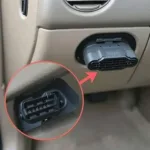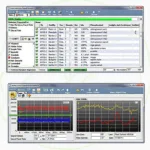Does OBD2 diagnose brake issues? This is a common question among car owners. While an OBD2 scanner is a powerful diagnostic tool, its capabilities regarding brake problems can be a bit nuanced. Let’s dive deep into understanding how OBD2 relates to your braking system. You might be surprised at what it can and can’t do. After reading this article, you’ll have a much clearer understanding of how to use your OBD2 scanner effectively for brake-related concerns. Here at OBDFree, we aim to provide you with the most accurate and helpful information.
Many modern vehicles rely heavily on electronic systems, and the braking system is no exception. The OBD2 system, primarily designed for emissions-related diagnostics, has expanded its reach to encompass other vehicle systems, including, in some cases, aspects of the braking system. This integration can be particularly helpful for diagnosing issues like ABS malfunctions or problems with electronic brake distribution. Want to learn more about how an OBD2 scanner can interact with your ABS system? Check out our page on obd2 scanner oxgord abs system.
How OBD2 Can Help with Brake Diagnostics
OBD2 scanners can be immensely helpful in diagnosing certain brake-related issues. They can detect problems with the Anti-lock Braking System (ABS), including faulty wheel speed sensors, which are crucial for ABS functionality. Additionally, the scanner can identify issues with the electronic brake distribution system, which controls the braking force applied to each wheel.
- ABS Malfunctions: OBD2 can pinpoint the problematic wheel speed sensor causing ABS issues. This targeted diagnosis saves time and money compared to checking each sensor individually.
- Electronic Brake Distribution (EBD) Issues: Problems within the EBD system can be diagnosed through OBD2, helping identify imbalances in braking force distribution.
- Brake Light Switch: A malfunctioning brake light switch can sometimes trigger an OBD2 code, alerting you to a potential issue.
Limitations of OBD2 in Brake Diagnostics
While OBD2 is helpful for electronically controlled brake components, it’s crucial to understand its limitations. Traditional mechanical brake problems, such as worn brake pads or a leaking brake line, often won’t trigger OBD2 codes.
- Mechanical Issues: OBD2 won’t detect worn brake pads, rotors, or drums, as these components are not electronically monitored.
- Hydraulic System Problems: Leaks in the brake lines, a failing master cylinder, or issues with the brake calipers typically won’t register with the OBD2 system.
- Parking Brake Issues: Problems with the parking brake mechanism, whether mechanical or electronic, are usually outside the scope of OBD2 diagnostics. Looking for OBD2 scanners that can calibrate brake sensors? Visit our page dedicated to obd2 scanner that can calibrate brake sensor.
When to Use an OBD2 Scanner for Brake Problems
An OBD2 scanner is a valuable tool when you experience symptoms like an illuminated ABS warning light, a pulsating brake pedal, or uneven braking. It can also help when your brake lights are not functioning correctly.
Can an OBD2 Scanner Diagnose a Soft Brake Pedal?
While a soft brake pedal might sometimes be related to an issue detectable by OBD2, such as a faulty ABS module affecting brake pressure, it’s more likely caused by a mechanical problem like air in the brake lines or a leaking master cylinder. These issues typically won’t trigger an OBD2 code. You can explore the relationship between vacuum readings and OBD2 systems on our vacuum reading obd2 page.
“OBD2 scanners are excellent for electronic brake issues, but remember they can’t see everything. A thorough mechanical inspection is still essential for comprehensive brake diagnostics,” says John Smith, ASE Certified Master Technician.
Beyond OBD2: Comprehensive Brake Inspections
While OBD2 provides valuable insights, a comprehensive brake inspection by a qualified mechanic is essential. This involves physically checking brake pads, rotors, drums, calipers, brake lines, and the master cylinder for wear, damage, and leaks. This also includes checking the brake fluid level and condition. More information on specific OBD2 components can be found on our page about ford obd2 component 21.
What if My OBD2 Scanner Doesn’t Show Any Brake Codes?
If you suspect a brake issue but your OBD2 scanner doesn’t show any codes, it’s crucial to have a mechanic perform a thorough physical inspection. The problem could be mechanical or hydraulic, which are often beyond the scope of OBD2 diagnostics.
“Never ignore brake problems. Even if your OBD2 scanner doesn’t show any codes, a professional inspection is crucial for ensuring your safety,” adds Maria Garcia, Lead Automotive Engineer.
Conclusion
So, does OBD2 diagnose brake issues? The answer is: partially. While incredibly useful for diagnosing electronic brake component problems, OBD2 cannot detect many common mechanical or hydraulic brake issues. A physical inspection remains essential. Using both OBD2 scanning and a professional mechanical inspection ensures a thorough diagnosis and keeps your braking system in optimal condition.
FAQ
- Can OBD2 diagnose worn brake pads? No, OBD2 cannot diagnose worn brake pads as they are not electronically monitored.
- Will a leaking brake line trigger an OBD2 code? Typically, no. Hydraulic system problems are usually not detected by OBD2.
- My ABS light is on. Should I use an OBD2 scanner? Yes, an OBD2 scanner can help diagnose the cause of the ABS warning light.
- What if my OBD2 scanner doesn’t show any codes related to my brake problem? Have a qualified mechanic perform a thorough physical inspection.
- Can I fix brake problems diagnosed by OBD2 myself? While some issues might be simple fixes, it’s often best to consult a qualified mechanic.
- Is an OBD2 scanner worth it for diagnosing brake issues? Yes, it can be helpful for diagnosing electronic brake problems, but it’s not a replacement for a professional inspection.
- Can OBD2 diagnose parking brake issues? Generally, no. Parking brake problems are often mechanical and outside the scope of OBD2. For more advanced OBD2 functionalities, you might consider options like the Carista OBD2 Dr Prius.
Need further assistance with your car diagnostics? Contact us via WhatsApp: +1(641)206-8880, Email: [email protected] or visit our office at 789 Elm Street, San Francisco, CA 94102, USA. We have a 24/7 customer support team ready to help.

